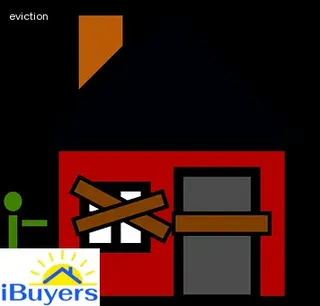Eviction is never an easy process, and understanding the different grounds for eviction is essential to protecting your real estate investment. There are a variety of reasons why landlords may need to evict tenants, including non-payment of rent, violating the lease agreement, illegal activities on the property, or if they are causing damage to the property.
It's important to be aware of all applicable state and local laws as it relates to evicting a tenant. In some states, there may be additional grounds for eviction such as holding over after the expiration of the lease term or abandonment of the premises.
It's important to be aware that evictions must follow all applicable laws and regulations in order for them to be legal. Landlords should also make sure that each step of the eviction process is documented thoroughly so that they can protect their real estate investments in case there is a challenge from a tenant or if legal action needs to be taken.

The most common reasons for eviction are generally related to non-payment of rent. Tenants who consistently pay rent late, do not pay at all, or cannot keep up with their payments can be subject to eviction.
Other typical causes for eviction include illegal activities on the property, such as drug use or other criminal activities, and violating the lease agreement in some way. Tenants may also be evicted if they cause serious health or safety hazards, damage to the property, or excessive noise disturbances.
Finally, landlords may issue an eviction notice if a tenant tries to hold onto the property after their lease is up without paying additional rent or signing a new agreement. In order to protect their investment, landlords must ensure that their tenants adhere to all terms of the agreement and take appropriate action when necessary.
When dealing with an unruly tenant, eviction is often seen as the only solution. However, there are other options available to landlords that should always be examined prior to taking this drastic step.
One such alternative is mediation, where a neutral third party can help facilitate an agreement between landlord and tenant. The advantage of mediation is that it allows for a settlement to be reached without the time and expense associated with court proceedings.
In addition, it allows both parties to maintain control of the situation by coming up with solutions that work for everyone involved. Another option for landlords is to offer incentives for early termination of the lease agreement.
This could include waiving certain fees or providing discounts on rent payments in exchange for an earlier move-out date. Finally, if all other attempts fail, landlords may consider settling with their tenant in lieu of eviction proceedings.
This arrangement would involve reaching a monetary agreement that works for both parties and allows the tenant to leave without having to go through an eviction notice or court hearing. While these alternatives are not ideal solutions, they provide landlords with viable options when attempting to protect their real estate investment while still being fair to their tenants.

When it comes time to evict a tenant, landlords must follow the proper steps or risk facing legal action. Starting an eviction notice is the first step in the process and should include clear instructions for the tenant.
Landlords should provide written notification to tenants outlining their rights and responsibilities, as well as specific details about why they are being evicted. This document should be signed by both landlord and tenant and include a timeline for when the eviction will take place.
It is important to stay organized during this process, so landlords should also keep detailed records of any communication with the tenants, including any payment history or other relevant information that may become pertinent. Additionally, landlords should seek legal advice if needed to ensure they are complying with all applicable laws.
Evicting a tenant can be a stressful experience, but following these steps can help protect your real estate investment from unnecessary risks.
In order to legally remove tenants who breach lease agreements, landlords must follow a specific legal process. This process usually starts with the landlord issuing an eviction notice that includes the tenant's violation and gives them a certain amount of time to vacate or remedy the situation.
It is important for landlords to keep records of any communication with their tenant as well as having proof of the violation in order to ensure they are following the law and protecting their real estate investment. After the eviction notice has been issued and depending on the state laws, landlords may be able to file an unlawful detainer action in court if the tenant fails to vacate or remedy the situation within the allotted time frame.
Before filing an unlawful detainer action, it is important that landlords have all of their documents prepared and organized in order to successfully navigate through court proceedings. This helps ensure that landlords are taking action against tenants who breach lease agreements without infringing on their rights as tenants.

When it comes to protecting your real estate investment, taking action when tenants don't pay rent on time is essential. As a landlord, it's important to have a written lease agreement and to clearly explain the expectations for timely rent payments.
Establishing a clear policy upfront can help avoid misunderstandings later on. If a tenant fails to make a payment, it may be necessary to take further steps.
Eviction proceedings are an option in some cases where a tenant has continually failed to pay rent on time, providing the landlord with legal protection against financial losses. The eviction process can vary by state, so it's important to research local laws and regulations before beginning proceedings.
In addition, landlords should document all rental payments and keep records of any communications with their tenants regarding late payments or other issues that arise. By taking these steps, landlords can protect their real estate investments and ensure they receive the income they are due according to their lease agreements.
Dealing with property damage caused by tenants can be a difficult and costly process for landlords. If a tenant causes damage to the property, then the landlord has the right to evict them as a way of protecting their real estate investment.
The landlord must prove that the tenant is responsible for damage, which may involve collecting evidence such as witness accounts, photographs, or video recordings. Additionally, finding out if any insurance policies cover the damages and filing an insurance claim can help offset repair costs.
Landlords should ensure that they have proper documentation of any agreement with their tenants relating to property damage and repair obligations in order to protect their rights throughout the eviction process. Finally, landlords should also consider consulting with legal professionals who specialize in these types of cases for advice on how to best proceed.

The COVID-19 pandemic has had a profound effect on nearly every aspect of life, and the real estate industry is no exception. For landlords and property owners, eviction moratoriums have been issued in an effort to protect tenants from financial hardship resulting from job losses and other pandemic-related issues.
Though these protections are designed to keep tenants in their homes, there are times when evicting a tenant may still be necessary. Before beginning the eviction process, it is important for landlords to understand their rights and responsibilities under the terms of an eviction moratorium as well as local laws governing evictions.
Additionally, they should consider alternate methods such as mediation or negotiation that could help resolve any issues with the tenant without having to resort to legal action. Ultimately, taking proactive steps to protect your real estate investment through understanding your rights and exploring alternate solutions can help ensure that any decisions you make concerning evicting a tenant are done so within the bounds of the law.
Evicting a tenant is not a decision to take lightly, as it can lead to potential complications if the process is not handled correctly. Before deciding on eviction, it is important to investigate the circumstances surrounding the tenant and any possible reasons that may have led to their failure to pay rent or abide by other terms of the lease agreement.
Furthermore, landlords need to be aware of any laws or regulations in place which may affect their ability to evict a tenant, such as those that protect renters from being evicted for certain reasons. It is also essential for landlords to understand the implications of eviction and how it might impact their real estate investment.
If done wrong, eviction can result in lost income due to legal fees or court costs associated with pursuing an eviction order. Landlords should also be aware of any obligations they may have after an eviction has been granted and make sure they are prepared to handle any potential issues that could arise from evicting a tenant.

It is important to understand the possibilities for early termination of leases when it comes to protecting your real estate investments. There are many reasons that a landlord may wish to evict a tenant, and each situation will require careful consideration before taking any action.
In some cases, it may be necessary to invoke a clause in the lease agreement that allows for an early termination due to violation of terms. Other times, it could be due to circumstances beyond either party's control such as natural disasters or job loss on the part of the tenant.
It is also possible that the landlord has found another suitable tenant and wishes to terminate the existing lease agreement. Whatever the reason, it is important for landlords to understand their rights and responsibilities when looking into evicting a tenant prior to their lease expiring.
By researching relevant laws, understanding local eviction regulations and exploring all available options, landlords can protect their investments while ensuring that all parties are treated fairly within the process.
When a landlord has to take their tenant to court for an unlawful detainer action, they face many potential consequences. Before going down this route, landlords should carefully analyze the risk of eviction on their real estate investment.
In addition to high legal costs and the possibility of a counter lawsuit from the tenant, an unlawful detainer action could result in a damaged reputation as well as lost rental income if the tenant is unable to be replaced quickly. Landlords should also consider how much time and money it will cost them to refurbish the property if it has been abandoned or neglected by a former tenant.
Taking all these factors into account can help protect your real estate investment while still providing necessary recourse when it comes to dealing with difficult tenants.
If you are a real estate investor, it is important to understand the legal process and timeline for evicting a tenant.
The fastest you can evict someone is through an expedited eviction process, which typically takes between 10 and 15 days from the filing of the complaint to the issuance of an order for possession.
This expedited process allows landlords to quickly regain control of their premises if they have chosen to terminate their tenant’s lease due to a breach in contract or failure to pay rent.
Landlords need to ensure that all state laws and regulations are followed during the eviction process in order to protect their real estate investment.